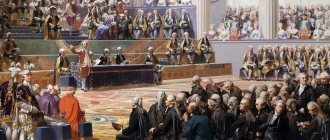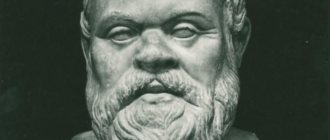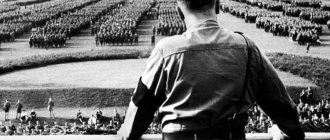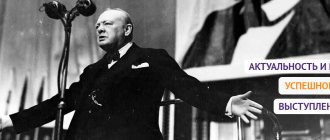No one doubts the power of a word spoken out loud. At all times, in years of serious upheaval and in years of prosperity, oratory had a huge influence on the historical development of countries. The dates and texts of public speeches of great speakers are included in world history textbooks along with the dates of reforms, military defeats, victories and great discoveries.
The word can comfort those who mourn, inspire those who are discouraged, and immortalize grandiose events with the dignity and solemnity that they deserve.
A word can send a person to heroic deeds or to death, make him risk his life in the name of ideals, make him laugh or cry.
One word can change the entire life of a person or an entire nation.
Knowing how to masterfully manage this instrument of influence, a person can have enormous power. Knowing this, tyrants and oppressors of all times have honed their skills as orators for their own purposes. The gift of persuasive speech can be used for both good and evil and should therefore be used with caution.
All that oratory is speech, but not everything that speech is oratory.
A lecture by a teacher, a speech by a political candidate, a presentation of a new product, all these speeches are not necessarily art, but they can nevertheless be elevated to this status. If public speaking can be compared to fast food, then the art of public speaking is haute cuisine.
Not in the sense that it is a gourmet dish, but in the sense that the professionalism required for its preparation requires a much higher level than for an ordinary public presentation. this dish is prepared with passion and creativity, and must be expertly presented and seasoned. And all this in order to get an excellent taste.
The art of public speaking has at all times been recognized as the highest of the arts, encompassing all other disciplines. This requires knowledge of literature, the ability to construct prose, ear and rhythm, harmony and musicality.
It is not just “speaking,” but speech that appeals to our noblest feelings, enlivens our soul, awakens passions and emotions, and inspires us to achieve our goals. Often, the best qualities of public speaking are revealed in times of tragedy and crisis, fear and confusion. In these cases, it serves as a light, a guide for those who cannot understand the chaos themselves and look to the leader to show the way.
“What offends the ears cannot penetrate the soul,” said the famous speaker.
In his works one can find many useful things for modern people: how to develop one’s talent through training and exercises, how a speaker should behave in front of an audience, what techniques can be used to decorate speech.
The era of Cicero and Quintilian was the highest flowering of rhetoric, but at the same time its final limit.
In the Middle Ages, church eloquence became the dominant genre. The Christian Church preached to everyone: both the rich nobleman and the poor peasant. Church preaching has become the most common form of oral mass communication.
The oratory art of the Middle Ages acquires a new quality. Whatever the priest spoke about, he correlated his judgments and conclusions with the Holy Scriptures. History has preserved the names of outstanding theological speakers. John Chrysostom - Byzantine preacher (died 407). The nickname itself indicates a respectful attitude towards public speech. Thomas Aquinas (1225–1274).
From the history of oratory
The objective basis for the emergence of oratory as a social phenomenon was the need for public discussion and resolution of issues of social significance.
The word “rhetoric” comes from the Greek language. Its synonyms are the Latin expression “oratory” and the Russian word “eloquence”.
There were two different views on the purpose of oratory, two approaches to its perception. Plato and Aristotle believed that the main thing in oratory is the idea, the content, i.e. rhetoric is the art of persuasion. “ Rhetoric is the ability to persuade with words...” -
Plato argued. At the same time, he emphasized the emotional persuasiveness of speech, not considering logical arguments important.
Others viewed rhetoric as the art of decorating speech, and considered its main advantage to be its form and style. For example, the Roman orator Quintilian believed that a speaker's speech should be pure, clear, beautiful and appropriate. His formula, which has survived to this day, was very popular: ars bene dicendi - “the art of speaking well.”
In Russian rhetorical science, emphasis was placed on the persuasiveness of speech, which Lomonosov also wrote about: “ Eloquence is the art of speaking eloquently about any ... matter and thereby inclining others to your opinion about it.”
».
Modern rhetoric is the science of persuasive and effective speech in various communication situations.
Oratorical speech is an influential, persuasive speech that is addressed to a wide audience and is aimed at changing the behavior of the audience, its views, and beliefs. Professional oratory plays a huge role in politics, business, and scientific research.
Thus, oratory is the art of constructing and delivering a speech in public with the aim of producing the desired effect on the audience.
Who and how does oratory serve is a question that has been trying to answer for centuries. It has always found its widest application in political activity.
Characteristics of the speaker's personality. A person speaking in public is the center of attention of the audience. Listeners perceive and evaluate not only speech, but also appearance, behavior, and personal qualities. Therefore, a speaker simply needs such qualities as: charm, artistry, confidence, objectivity, passion.
Can everyone become a good speaker? Some believe that only natural abilities can make a person a speaker, others argue that the qualities listed above are acquired, developed, and everyone can cultivate them in themselves. According to Cicero, “Poetae nascuntur, oratores flunt” (poets are born, orators are made).
In oratory, the moral position of the speaker, his moral responsibility for the content of the speech is important. It is very important that the person speaking from the podium be a highly moral person, because his speech can influence the destinies of people and their mindset. The Roman orator Quintilian summarized the requirements for the personality of an orator in the aphorism: “if you want to become a good orator, first become a good person.”
And the ancient Greek rhetorician Gorgias spoke about the influence of the oratorical word on the destinies of people: “The word is a great ruler who ... accomplishes the most wonderful things, for it can instill fear, and destroy sadness, and instill joy, and awaken compassion.”
History shows that the most important condition for the free exchange of opinions is democratic forms of government, which is why oratory is called the “spiritual child of democracy.” A historical example is the comparison of Sparta and Athens, which had different government systems. The Spartan barracks state did not leave anything worthy for its descendants, while the democratic forms of government in Athens produced outstanding speakers, thinkers, and poets.
Oratory is characterized by the fact that it is a historical phenomenon
and must take into account the public interests of its time. Each historical era imposes its own obligations on the speaker and makes its own demands.
Another feature of oratory is that it is closely related to philosophy, psychology, pedagogy, logic, linguistics, ethics and aesthetics. Linguists, for example, develop a theory of the culture of oral speech and give advice on how to master the art of eloquence and how to take advantage of the richness and diversity of the native language. Psychologists consider issues of speech influence and perception, explore the psychology of the speaker’s personality and the attention of the audience as a socio-psychological community of people. Logical science teaches a consistent and harmonious presentation of thoughts, methods of argument and refutation of various judgments.
The history of oratory is one of the most remarkable pages of history, and familiarity with the experience of outstanding speakers of the past allows us to improve modern rhetorical culture.
Oratory arose simultaneously in different countries: Ancient Greece, Rome, Assyria, Egypt, Babylon, India. In Ancient Greece it is associated with such names as Plato, Demosthenes, Democritus, Aristotle.
These Enlightenment philosophers were excellent at all forms of oratory, and rhetoric was considered the “queen of all arts.” In his scientific treatise “Rhetoric,” Aristotle first determined that the effect of persuasive speech depends on the moral character of the speaker, the quality of the speech itself, and the mood of the listeners.
In the second half of the 5th century BC. Hellenistic rhetoric dominated in ancient Greece. Its representatives are Dionysius, Demetrius
, the so-called
atticists
, were supporters of purity of speech; they preached refined imagery and intellectuality of speech.
As mentioned above, the condition for the prosperity of oratory is a democratic form of government. It was during these years that Greece flourished. This can be seen in the example of Pericles
, who ruled Athens for 15 years and was a magnificent orator;
contemporaries said about him that “the goddess of conviction rested on his lips.”
Remarkable speakers of their time were progressive thinkers and poets of the East: Alisher Navoi, Sherozi, Abu Ali ibn Sino.
An oratorical career was especially honorable and profitable in Ancient Rome. The ability to persuade an audience was highly valued by people preparing for a political career.
One of the first Roman orators was Marcus Cato the Elder.
Thanks to his oratorical talent, he achieved an honorary position in the Senate.
The most prominent political figure of that time was Marcus Tullius Cicero
(106-43 BC).
His treatises reflect the rich experience of ancient rhetoric and his own practical experience. It was he who came up with the phrase: “ There are two arts that can elevate a person to the highest level of honor: one is the art of a good commander, the other is the art of a good speaker.”
He believed that the basis of oratory is deep knowledge of the subject of speech, natural talent, liveliness of mind and feelings.
The famous Roman rhetorician Marcus Fabius Quintilian
(35-100 BC), the author of a well-systematized work in twelve books, “Rhetorical Instructions,” gives a complete theoretical analysis of the science of eloquence.
Orators and eloquence theorists of Ancient Greece and Ancient Rome were able to penetrate the mystery of the word, expand the boundaries of its knowledge, and put forward theoretical and practical principles of oratory. Their works contain such an interesting and deep analysis of the art of persuasion that many centuries later their ideas are still relevant.
This type of rhetoric influenced the countries of Central and Western Europe.
The spread was facilitated by the absence of language barriers (sermons were read in Latin).
“Modern times” began with the Western European Renaissance, which put an end to the Middle Ages and by the beginning of the 16th century. marking a new era. It was then replaced by the Age of Enlightenment.
European writers and thinkers B. Pascal, M. Montaigne, Jean de La Bruyère, F. Bacon and others in their works left a lot of subtle advice to the speaker, precise recommendations. As in ancient rhetoric, serious attention is paid to speech technique, manners, and gestures.
For example, Leonardo da Vinci wrote:
“Good speakers, when they want to convince their listeners of something, always accompany their words with their hands, although some fools do not care about such decoration and seem like wooden chairs on their podium.”
If we turn to Russian history, then first of all we should highlight the personality of M.V. Lomonosov (1711 – 1765). It was he who undertook the difficult reform of the Russian language and laid the foundations of modern literary Russian speech. In his work “A Brief Guide to Eloquence” he wrote:
What is a good speaker?
A master of oratory is a person who easily masters the living word and can use it to influence an interlocutor or an entire audience. Speaking about such a professional, one cannot fail to mention the high level of speech culture. Good diction eliminates any unclear pronunciation of words and individual sounds. The speaker is pleasant and easy to listen to because there are no tongue twisters or lisps. The power of the voice is manifested not only in volume, but also in the mental impact on the consciousness and will of the listeners. In other words, the speaking technique of a real speaker is approaching perfection.
An accomplished speaker skillfully uses various techniques. For beautiful speech, the use of popular expressions, well-known proverbs and sayings is of great importance. When they are unexpected, but said to the point, the speech seems more interesting and better remembered. The speech culture of a speaker is always assessed by the richness of his vocabulary. The more words a professional has in his arsenal, the more interesting it is to communicate with him. And if, in addition to all this, the sentences are laconic and well-constructed, observing the accuracy of word usage and language norms of pronunciation, then such a speaker has no price.
Why is there fear of public speaking?
Let's analyze this issue. For most of us, talking with a friend is a normal and enjoyable pastime. And at the same time, a similar conversation on the same topic in front of an audience seems to be something unnatural and causing internal anxiety. Why? The point is that your role is changing.
In everyday life, when participating in a conversation, we rarely experience pressure from others and the environment in which the conversation takes place. We know that at any second, as soon as we find ourselves in a difficult situation, we can refuse to continue the conversation and relieve ourselves of any responsibility for it.











